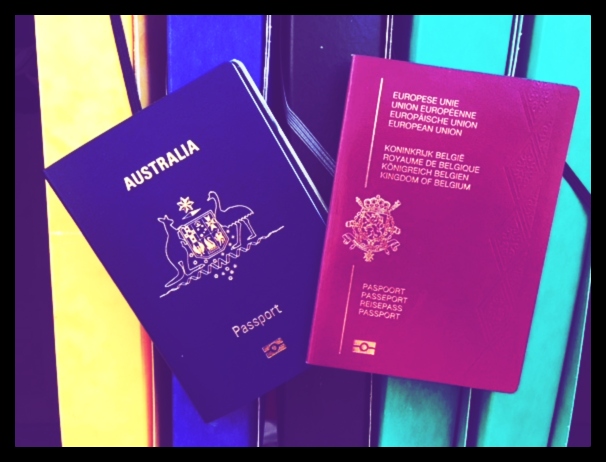(* feature image cropped from a Juan Felipe Rubio: http://rubiobuitrago.com/)
I can honestly say that one of the most painful things I’ve ever had to endure is a broken heart. Sounds just a tad bit dramatic right? I know, but hear me out… When losing loved ones, moving countries, going through surgery, etc., I could rationalise to a certain extent ‘why’ some of these things happened. It made working through them a little easier (now I didn’t say “easy”, I said “easierrrr”). It’s not a competition of which one hurts the most, but with a broken heart, I feel people are often left with a whole bunch of questions that are likely never to get answers… and it’s that inability for closure part that seems to be the kicker for most.
Without my fair share of the occasional crush-like heartaches and the agonizing experience of an actual ‘broken heart’ I probably wouldn’t have become the person I am today. Although my heart has long recovered since then, it’s not something you completely forget. My heart may no longer be broken, but I’d say it will always be just a little bit bruised, but I wouldn’t have it any other way. I will never regret the ones I once loved; because, back in the day, they were exactly what I needed.
What is a broken heart?
A broken heart is more of a metaphor for intense emotional, and sometimes physical, stress or pain one feels at experiencing a great longing (thanks Wikipedia). It’s something we can find cross culturally, and although it can very well apply to the loss of a loved one, it’s more commonly references to the desire or loss of a lover. Some emotional pain can be so severe it even causes actual, physical damage to your heart known as ‘broken heart syndrome’ (what a way to make your ex feel guilty with that one, huh!). A broken heart can present itself in many different ways from eating a tub of ice cream in front of the TV, calling your friends in tears for 2 weeks straight (okay, a month straight), beating the crap out of a boxing bag at the gym or drunk texting your ex at 3 am (which, I promise, is never a good idea).
But despite the heartache and going through a shitty time, I still very much agree with Tennyson’s famous “It is better to have loved and lost than never to have loved at all“. It might not feel like it at the time, but eventually you’ll get to a place where you can look back on your time together with fondness and, who knows, even remain friends. Others might prefer looking back with slight rage and never see the person again in their life which works too … whatever floats your boat really. The point is, there are ways to move passed it and continue your life with their part just no longer in it.
Below are a few trialled and tested ways, by myself and some friends, that have gotten us through dealing with our own, broken hearts.
- Grab the pain by the horns
Dive into the deep-end and accept that you will have to go through a rough patch. If you loved someone enough to be heartbroken, it’s unrealistic to think you won’t suffer a little bit. Of course it is easier said than done to just stand there and take it. But that is exactly what we must do. You have to grieve in order to move on as it’s a natural part of the healing process. Any psychologist would tell you that you need to go through the issue and not around it. If you go around it, it will eventually rear its ugly head somewhere else. While grabbing the pain by the horn, eventually it will tire and loose its grip on you.
- Talk it out
Going through a heartbreak doesn’t get the same acknowledgment as a death in the family for example. We don’t get time off work, and people give us sympathy as we all deal with the loss together. Some people tend to minimise a broken heart (especially if they ‘ve never experienced one themselves or they have forgotten what it’s like). It’s important to surround yourself with people who are understanding which can give you the support you need as well as distract you from the current situation. Ask any of my closest friends, because they have been my shoulder to cry on for years. Having people accept the pain with me helped me better work through it; and having friends strong enough to give me the occasional mental slap-in-the-face helped me keep things in perspective when I got stuck in a dramatic cycle.
After on-and-offing it with someone close to me for years, without him wanting to fully commit, I came home in tears for the umpteenth time. My roommate, who had had a first row seat to it all, in the end – and quite firmly- said: “You know what Stef. It’s just not good enough”. That one little sentence flicked a sudden switch in my brain that showed me I obviously needed more than what this relationship was giving me. I thought I was in love, but perhaps I had grown more in love with the ‘idea of him’ over the years. Safe to say it’s what I finally needed to hear in order to start the process of walking away from that situation once and for all.
- You’re responsible for your own happiness
Happiness is a choice and nothing will make you happy until you choose to be happy. It’s a powerful thing to have, your happiness, and we shouldn’t assign anyone else that much power over our life. It doesn’t come to you, it needs to come from you. Heck, some might need to ‘fake it before we make it’ to retrieve some of that happiness, but eventually it does come back to you…. if you let it.
- Cry
As a psychologist and as a friend, I always encourage people to cry it out! My favourite metaphor is the ever-filling bucket of water we call ‘life’. We continually have things pour into our bucket and then stress-manage our way into maintaining a reasonable balance by letting some of the water out. Some days however, that bucket flows over, and we need to make some space. Crying literally does that for us! Biochemist William Frey, who has spent 15 years as head of a research team studying tears, came to the conclusion that emotional tears (as compared to tears of irritation, like when you cut an onion) contain toxic biochemical byproducts. Crying removes these toxic substances and relieves emotional stress. So go grab a box of Kleenex and cry your little heart out! (I’m about to contradict myself with point 5 below, but listening to that ‘one song’ can help get the weeping process started. Just make sure you turn the song off once the tears flow.) A pitty party can be useful, just don’t let it overstay its welcome.
- Change some of your habits
The main issue with being broken-hearted is that we seem to relive our misery over and over again. We listen to music that reminds us of our ex, we check out their social network account, or in some cases we still see them ‘intimately’ without the commitment (which really is just a way to hang on to them for as long as we can because we’re just not ready to let go). Regardless of how it happens, we end up being locked into a repeating dysfunctional pattern of behaviour. Without perhaps realising it, you have programmed yourself to feel a certain sense of grief every time you hear ‘that song’ or are confronted with a picture of them on Facebook. Our pain has now become a mental habit, and this habit, must be broken. We need to try and find ways to break those mental connections by turning off the music that reminds us of them, staying off social media (or at least their account), and for Pete’s sake stop sleeping with them !! The changes you make don’t have to be permanent (well…. except for the sleeping together part), but their aim is to break up the old associations and give you a new environment for your new part in life. Even if it’s as minimal as moving around some furniture, changing your perfume or deleting their number, changing something now will already make a difference.
Getting away from the situation, be it temporary, can also help us regain some perspective and recharge our batteries. Not everyone can afford a lavish holiday away to get over a relationship, which is why a friend of mine rented a cheap little cabin in the woods for a few days and spent her time hiking in nature. “After a while I felt a little creeped out being out in the woods on my own, but at least it took my mind off the other things for a few days” she chuckles.
- Exercise
This might sound like such a cliché on dealing with any kind of emotional distress, but thousands of health professionals and lifestyle blogs wouldn’t keep encouraging you to exercise if it didn’t significantly help with managing our emotions!
Elnaz remembers a past break-up left her feeling unable to control the situation, which turned her to exercise. She hired a trainer and took control of the one thing she could… her own body and her own motivation. “My trainer made me feel strong again and built up my self-worth” she states. “They showed me I could have control again in a time where it didn’t feel I did (and as a bonus I worked on a ‘revenge body’ where I turned out feeling and looking better than what I did before).”
Anna, on the other hand, turned to yoga. After a break-up she happened to find herself in a yoga class which helped her put things in perspective and acknowledge that her happiness was hers to maintain (as we covered earlier). “You focus on yourself and not the forces around you that you can’t control” she explains.
- Feel some kindness towards your ex
This might not always be easy depending on how and why you ended your relationship, especially at first; but it’s not about keeping in touch with an ex or being best buddies. It’s about letting go of any anger and wishing them well in life. From where I stand, just because a relationship didn’t work out romantically doesn’t always mean it has to end completely. I was good friends before with my ex and although we may never be the best of buds again, I wasn’t prepared to delete our friendship entirely. Of course, I needed a chunk of time to pass by before I could truly feel good about being in contact with him again, but time, for us, did seem to heal most wounds. My situation might not work for everyone, and all this can be done in your own mind, you don’t need to call them to wish them happiness, but it can help bring balance and peace to our own inner consciousness.
And remember to love again…
Once our hearts are bruised and battered from a relationship that ended, we have two options: we can close off pieces of our heart so that no one will be able to get back inside. Or we can love again. Deeply, just as intensely as we did before. Henri Nouwen urges to love again because he believes the more you have loved and have allowed yourself to suffer because of your love, the more you will be able to let your heart grow wider and deeper.
It sure as shit doesn’t feel like it at the time, but the pain of rejection/absence can, in fact, become constructive, you just need to be open to taking that risk again…










